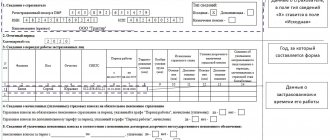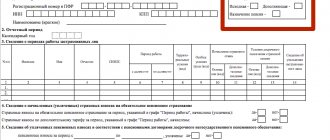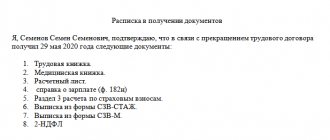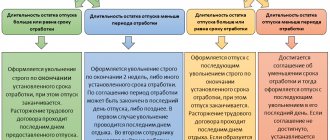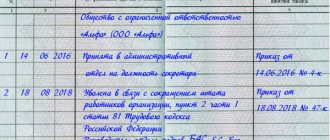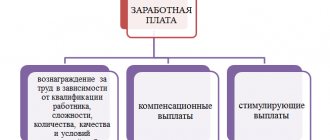How many hours do you need to work if you quit today?
The date of dismissal is the employee's last working day. On this day, the employee is required to go to his workplace and work a full schedule. This is the standard 8 hours or other time specified in the employment contract. However, management may release the employee earlier, when personnel procedures are completed, that is, the employee receives a salary package and pay.
The date indicated in the order (instruction) to terminate the employment contract must fall on a working day.
- If a person is on sick leave when the employer decides to fire him, the last working day will be the day after the employee returns from sick leave.
- An employee may go on vacation followed by dismissal. Then the end date of the employment contract will be the last day of vacation. You will need to come for your payment and work book on the last day before your vacation.
Whether an employee who resigns voluntarily is obliged to notify the manager in advance is determined by law: he must do this 14 calendar days in advance. The application for termination of the contract specifies a specific dismissal period (date) chosen by the resigning employee. Based on Art. 14 of the Labor Code of the Russian Federation, the working period begins the next day after the employee submits the application. If the application is submitted on March 1, you will need to work until March 15.
By agreement of the parties, this rule may not be observed. That is, the employer and employee can agree on any day to leave work.
If 14 days from the date of submission of the application fall on a weekend or holiday, according to Art. 14 of the Labor Code of the Russian Federation, the end of work will not be this day, but the next one.
The law does not specify what kind of work schedule should be before the end of the employment contract. In life, conditions are discussed personally between the employee and the employer.
Basically, a person devotes his working time on the last day at work to:
- fulfillment of official duties;
- bringing started projects to actual completion;
- transferring projects to a successor or colleague;
- passing personnel procedures for dismissal.
In the legislation, namely in Art. 84.1 of the Labor Code of the Russian Federation describes in detail what an employer needs to do before terminating an employment contract with an employee:
- issue a dismissal order;
- make an appropriate entry in the employee’s work book;
- pay money in the form of wages and vacation compensation (if any);
- provide copies of work-related documents if the employee requests it.
After payments are made, the employee is returned his work book with the entry.
Last working day upon voluntary dismissal
If the employment contract is terminated at the initiative of the employee, that is, upon dismissal of his own free will, the employee must notify the employer about this and notify him in writing no later than 14 days in advance (Article 80 of the Labor Code of the Russian Federation). This period begins to run the day after the employer receives the employee’s resignation letter.
For example, if an employee wrote a letter of resignation on May 3 and gave it to the employer on May 4, then the countdown of two weeks will begin on May 5, and May 18 will be considered the last working day.
Lawyers specializing in labor law recommend that in your resignation letter you do not use the wording “dismiss from…”, but write a specific date of dismissal.
In this case, the preposition “with” introduces ambiguity: the HR employee may not understand whether the date indicated by the employee is the last working day, or whether from this day he no longer plans to appear at work. To avoid confusion, it would be acceptable to write in the application, for example: “I ask you to dismiss me voluntarily on May 10,” which means that on May 10 the employee works his last day.
According to Art. 80 of the Labor Code of the Russian Federation, dismissal at one’s own request can be made before the expiration of a two-week period if:
- an agreement has been reached between the employee and the employer on this issue - the last working day is determined by both parties to the employment contract;
- the employee cannot continue to work (due to retirement, enrollment in an educational organization, etc.) - the employer is obliged to terminate the employment contract within the period specified by the employee;
- in the event of an established violation by the employer of labor law norms or local regulations , dismissal is carried out on the day specified by the employee.
Is it possible not to do this?
A dismissed employee may be absent from the workplace on the last day only for valid reasons. Otherwise, the employer has the right to issue him absenteeism and dismiss the offender on his own initiative.
Valid reasons may be:
- employee illness;
- flight cancellation;
- Absenteeism from work due to salary delays of more than 15 days.
In the latter case, the employer must be notified in advance in writing. If an employee is sick, he needs to issue a sick leave certificate, otherwise he may be given absenteeism.
An employer cannot voluntarily fire an employee while he is on sick leave or on vacation (Article 81 of the Labor Code of the Russian Federation).
Also, an employee may not go to work either on the day of dismissal or on the day before dismissal if he is on vacation or on sick leave. In these cases, he can resign only of his own free will.
Date of dismissal and terms of service
In order for the employment contract to be terminated at the request of the employee, he needs to draw up a corresponding application (he can indicate in it the reason for his decision). From the moment it is submitted to the employer for consideration, the employee must work for 14 days so that a replacement can be found in his place.
Sometimes an enterprise has to lay off workers for reasons of economic instability, following the procedure for dismissal to reduce staff or headcount.
If the dismissal was initiated by the employer, then the employee does not file a statement. He is not required to work a 2-week period. In case of bilateral termination of the contract, the duration of the work and its necessity can be discussed between the employee and management.
The dismissal procedure involves the publication by the employer of a corresponding order, two-week work (at the initiative of the employee upon termination of the contract), payment, and issuance of a work book. In this case, the date of dismissal is considered the last working day, even if the employee did not actually perform his duties.
Dismissal of employees during liquidation of an enterprise is discussed here.
Work and payment on the last day
Since the day of dismissal of an employee is considered a working day, except in certain cases, he must be at work and perform his official duties as usual (if he is not on vacation). Management is obliged to pay all payments due to the employee, which include:
- salary for hours worked;
- vacation pay and compensation for unspent vacation from previous periods;
- severance pay (if provided);
- other compensation payments.
Also, the person must be given a work book, in which the corresponding entry must be made.
Next, we will look at several specific cases and determine for them which day is considered the day of dismissal.
What to do if you are fired during maternity leave?
According to the Labor Code of the Russian Federation, there are no obstacles to terminating an employment relationship on grounds not related to the will of the employer. For example, while an employee is on maternity or child care leave. Will the day of dismissal indicated in the application at one's own request or by agreement of the parties be a working day or not in this case?
No. There is no need to recall the employee from vacation and call the employee to the workplace in such circumstances . In this situation, the employee is officially released from performing her official duties while maintaining her job (Part 4 of Article 256 of the Labor Code of the Russian Federation).
By agreement of the parties
If the termination of the employment relationship is carried out by agreement of the parties, then dismissal requires the employee’s desire to resign without coercion.
The employer does not have the right to condition the notice of termination of the employment contract on the desire to get rid of an unwanted employee. Termination of an employment contract by agreement is carried out on a general basis. The document must be signed by the parties and provide for a clearly defined period for termination of the employment relationship. After the expiration of the time allotted for the execution of the agreement, the employee has the right to stop working and demand from the employer payment of the calculation, provision of a work book, as well as a certificate of wages accrued during the period of employment at a particular enterprise.
Fines for failure to issue documents
If there is a delay in issuing documents or certificates upon dismissal of an employee, the employer may be held liable. Failure to receive a work book on time is a temporary deprivation of a person’s source of income. In this case, in accordance with Article 234 of the Labor Code of the Russian Federation, the former employee must be paid for moral damage . a system of fines for failure to issue documents :
- The manager can be fined a considerable amount from 5 to 10 thousand rubles .
- For an enterprise, the amount of fines can range from 30 to 50 thousand .
- In case of repeated violation, the amounts increase: 10-20 for the manager , and 50-70 for the organization .
What does the law say about the last day of work?
In Art. 84.1 of the Labor Code of the Russian Federation states that the day of termination of the employment contract with the employing company is considered the last working date of the specialist. He spends his official time performing the usual functionality, completing started tasks, transferring cases and performing other actions necessary to continue the work process. Letting an employee go is the good will of his superiors.
The answer to the question whether it is necessary to work on the day of dismissal, given in Art. 84.1 applies to specialists who work in a classic five-day week. They follow the standard procedure for parting with the employer: they warn him by submitting a written application, work the required two weeks, receive a payment and documents, and leave the company.
The rule does not apply to citizens who worked at the enterprise not actually, but formally, i.e. For certain reasons, their position was retained, although they did not actually perform its functionality. Such specialists cannot be brought to work even on the last day before dismissal.
Special rules apply if a two-week work period ends on a weekend or holiday. The law recognizes the working day following the date specified in the application as the last day in service. A person must come to the organization to receive a payment, sign an order and pick up personnel documents, but management does not have the right to involve him in the performance of official functions.
If a person is not asked to appear on a working day, this will be considered a violation of applicable law. Formally, within 14 days of service, he can withdraw the application and continue relations with the organization. If the employer fires him on Friday, he will deprive him of his two required “reflection” days.
Another special case is if a specialist works on a shift schedule, for example, 2 through 2. The answer to the question whether an employee should work on the day of dismissal is clearly positive. However, if this date falls on a Saturday or Sunday, a public holiday, management must appear at the enterprise in order to complete the administrative procedure in a timely manner.
The right to leave upon dismissal of an employee
Can they be fired while on sick leave, on vacation or during a business trip?
It is impossible to dismiss an employee during a period of temporary disability or regular vacation only on the initiative of the employer. In all other cases, illness or vacation is not an obstacle to terminating an employment contract. It is also quite acceptable if the termination of the contract occurs on the last day of the business trip. It is acceptable, but not advisable, since the employee will not be able to receive the work book on time, and you will have to send him a corresponding notification by mail. Yes, and with the calculation there will be questions.
Arbitrage practice
N. filed a lawsuit for reinstatement at work and payment of wages for the period of forced absence.
At the court hearing, it was established that N. submitted a letter of resignation of his own free will. Three days before the date of dismissal, N. went on sick leave and was ill for two weeks. The employer terminated the employment contract with the employee on the day specified in his application. However, N. believes that he was fired illegally, because at that time he was on sick leave and changed his mind about leaving work.
The court refused to satisfy N.'s claims, pointing out that the prohibition on terminating an employment contract during a period of temporary incapacity for work by an employee does not apply to cases of voluntary dismissal.
